#name analysis
Text
A Linguistic Analysis of the Spelling Names "Ania" and "Anya" (and the chapter and languages of Ostania)
This includes spoilers from Short Mission 11, or Chapter 90.1
It's not a secret that Anya's (Ania) name change was officialized along with Loid (Lloyd) and Yor (Yoru/Yolanda) in July 2019. I do recall that our loveable Forger family had different spellings in the early manga releases. Many believed that it was Endo-san's way to cover up the spelling mistake, but I believe that, whether or not the origin and/or intention was a mistake, it paved a beautiful opportunity for a deep dive into linguistics and character analysis on Anya Forger.
First, I'd like to address my thoughts on "ANIA" as the spelling. Here are a few of my impressions on this:
"ANIA" could be perceived as her original spelling because wherever she came from used this spelling.
"ANIA" could just be her limitation as a child when it came to spelling her name.
"ANIA" could be an acronym from her lab that probably served the purpose of her existence.
"ANIA" could be the name of her mother/creator. And she was subjected to share the same name of her creator for "sourcing" purposes.
"ANIA" when applied to numerology number, reinforced her code name which is 007 (which is super meta to me, but probably is a coincidence because we all know 007 was Endo's way of referencing James Bond). S/O to @momentocollector for sharing this!

Second, I'd like to address "ANIA" as an identity for our precious baby girl.
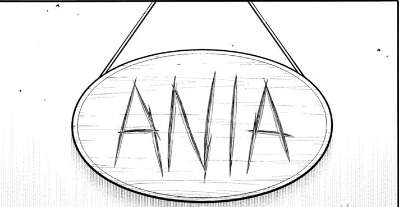
"Ania" is the chosen spelling. This could possibly mean that this is her real name and how it should be spelled (You, as the owner of your name have every right to decide what your name should be, spelled, or pronounced after all).
"Ania" could possibly be an influence of either her mother-tongue language's spelling.
"Ania" could possibly be due to her limitation of spelling. (I don't think she is aware of how her name should be spelled.)
Recall that Yor carved out Anya's name as "Ania" and didn't question it. This could be a reflection of Yor's own lack of familiarity of Ostanian orthography since she is academically limited, and she would have listened to how Anya would have wanted her name to be spelled. Furthermore, this tells me that Yor's absence of questioning reflects that she accepts her daughter no matter who she is, be it "Ania" or "Anya".
Third, I'd like to address "ANYA" as her name's spelling.
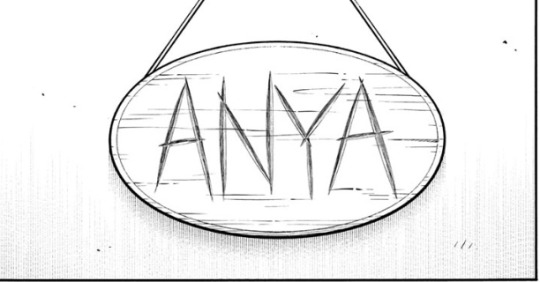
"A-N-Y-A" is the spelling that her papa gave her, which tells her that she can now be on the same playing field as her parents. Their names and titles are all "masks" in this masquerade that they call "Forger". So, to little Anya, it means that she finally belongs with someone. Anya has essentially found "her home".
We also know that Franky did do a lot of paperwork and found that "Anya" is the spelling that was written down on her adoption papers. This reinforces that "Anya" is the standard Ostanian orthography of her name.
I perceive Loid as a person replicating the "average Ostanian" (since this is a deep cover mission after all), so to also tell her that her name is spelled a certain way reinforces that she has a new identity as an "Ostanian child". (I find this quite ironically poetic because it's a "fake man" giving a "fake name" to his "fake daughter").
I also see that when Anya's eyes light up, it could also mean that this new identity in her spelling change meant she was finally liberated from her days as a lab experiment and living in an orphanage.
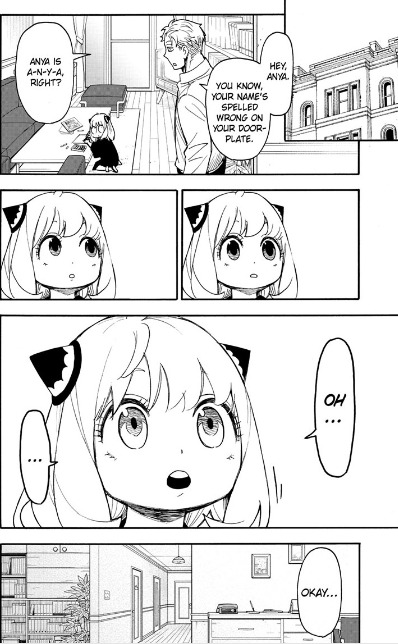
Fourth, I'd like to address spelling etymology.
Since I'm not a Japanese linguist expert, I found @connoisseursdecomfort post to be quite educational when it came to Japanese spelling.
What we learn from the above post is that "Ania" is an acceptable name spelling in "Old Japanese". But as time progressed, the spelling changed to "Anya" which is the modern-day spelling of this name (this may tie into Anya's character lore).
We can track "i" becomes "y" in the evolution of the alphabet from Phoenician (c. 1000 BC) to Archaeic Greek (c. 750 BC). S/O to @rachellysebrook for this link. (Again, what this reinforces is Anya's background with an unidentified mother country/mother tongue language).
Another thing is that Yor Forger did not react to the spelling of "Ania". It could possibly be that she recognized Anya's limitation, given that her daughter already had poor scores since her admission.
We also learned that Yor, a real Ostanian, seems to be limited with Ostanian orthography which is most likely due to her dropping out of school to take care of Yuri (fake Ostanian /j). From her interaction with Anya, off-screen, it appears that Yor seems indifferent to spelling standards of names (Which is nice! She is subtly against society's norm and I love her for that). Had she been aware of the spelling, she would have been the one to ask instead of Loid. (But again, it must be Loid because it's poetic and has a much more meaningful interaction between "Loid" and "Anya").
Fifth, I'd like to address the name's (possible) impact on character purpose in the story.
"Anya" means mother in Hungarian (S/O to @httplovecraft1890. This inspired my thoughts on "Ania" as a name in the lab). Could this possibly be an inspiration or coincidence? It could be a stretch, but perhaps Anya's purpose in the lab is that she's a "mother weapon" for war.
"Ania" means "gracious" and "merciful" according to Google. Which makes me think that the lab scientists went with this name because it would represent her purpose as a weapon of war. Perhaps Ania becomes the "truth serum" and could be seen as the "angel of death" because she knows the war captor's thoughts and inevitably they are executed (a possible headcanon).
Sixth, I'd like to discuss the factors of the mysterious "unidentified language".
Anya did use "oui" in the anime when Loid had adopted her. This automatically made me think her possible origins could be French, but it could also take another step back in the language family: Romance. What makes this work is that we treat "Classical Language" as a dead language based on what we read/saw in the manga/anime like Latin. Anya has an innate potential to be bi-/multilingual.

Bonus: Seventh, I'd like to talk about the languages in this anime (This is a bit of a ramble but since we're talking about linguistics, I thought why not)...
Based on the dialogues spoken in the anime, we can confirm that English exclamatory (Oh my God, Goddammit, Shit, Wow, Elegant, etc.) and the Japanese language are the main components of the Ostanian language. This is reinforced by many characters who have used English expressions (Loid, Yuri, Yor, Anya, Damian, Henderson, etc.)

What does bug me is whether or not "oui", a French exclamatory, should be categorized as part of the Ostanian language or if that should be categorized for Anya's hidden lore. The reason is that when Loid/Twilight heard Anya say "oui" in front of him, he did not question it. (Perhaps he was too tired to process this, or he excused it as something Anya could have seen on TV and is merely mimicking. I really don't think Twilight would be the type to excuse this realization had he not had the aforementioned state of mind). I'm leaning more towards the latter as this is from Anya's mother tongue language.
In conclusion (or tldr;): "Ania" may be her real name, but "Anya" is her new identity as part of the Forgers.
If you read everything, thank you for your time! The linguist in me is so happy that Endo-san is steeping his foot into linguistic territory. As short as this chapter was, it said A LOT to me linguistically and provided more details to the scraps of lore that we know of Anya but it also tells us a bit more about Yor, Loid/Twilight, and Ostania.
#spy x family#spy x family spoiler#spy x family chapter 90.1#Anya Forger#Ania#Anya#name analysis#manga chapter analysis#analysis#Spy x family Analysis#linguistics#orthography#loid forger#yor forger#scarlymadeathing#scarlydidathing#scarlywroteathing
249 notes
·
View notes
Text
Let's talk about the first names of the Dracula characters.
Jonathan - 'God has given', 'Gift of God'. First appears in the Bible as the son of Saul. A very popular name, though has risen in popularity more recently. In 1885, it was the 674th most popular boy name, whereas in 2021 it was 114th most popular.
John - 'God is gracious'. Popular biblical name with similar origins to Jonathan. In 1885, it was the 2nd most popular boy name. The nickname Jack also has Celtic origins which mean strong and healthy. In 1885, it was the 163rd most popular boy name.
Wilhelmina - Of German origin meaning safety or helmet. Queen Wilhelmina of the Netherlands who was born in 1880. In 1885, it was the 403rd most popular girl name. Mina means 'love'. In 1885, Mina was the 383rd most popular girl name and the name can be used as a term of endearment.
Quincey - A gender neutral name meaning 'estate of the fifth son'. This is perhaps symbolism of him being the fifth male in the Light Crew. It is derived from the Latin quintus meaning five. It is of French and English origin. In 2022, it was 9705th most popular boy name and 12552th most popular girl name. (The chart I am using doesn't go back to the 1800's, sadly.)
Arthur - Celtic, Latin and Welsh origin. It is believed to be derived from the word artos, meaning "bear." As experts differ on its precision origin, the name can also mean "Thor", "the eagle," and "strong man." Arthur became a popular choice during the Middle Ages, as families named their boys after King Arthur of 6th century England. Arthur's last names are very interesting too and I will make a post about their last names if people are interested. In 1885, it was the 12th most popular boy name, and now it is the 256th.
Abraham - Named after Bram Stoker. Meaning father of multitudes or father of nations. Named after the founder of the Jewish people. In 1885, it was the 384th most popular boy name, a position is withholds today. Of Hebrew origin.
Lucy - Meaning light bringer. Derived from the Latin, masculine origin Lucius. In 1885, it was the 76th most popular girl name and is now the 127th.
#dracula#john seward#goth lit#name meanings#abraham van helsing#arthur holmwood#quincey morris#lucy westenra#mina murray#jonathan harker#gothic literature analysis#gothic literature#name analysis
65 notes
·
View notes
Text
[mdzs] In depth analysis of Lan Xichen’s name
It’s been 2.5 years since my last MDZS name analysis(!!), and since then I’ve gotten so many requests from the fandom wanting to see more. So here’s to everyone who have enjoyed reading my posts so far - today I’ll be diving into Lan Xichen’s name. Sit back as this is an interesting one!

Lan Xichen is his zi ,or courtesy name, which means ‘chancellor of the morning sunlight’ (Xi 曦 - morning sunlight; Chen 臣- chancellor, minister).
It derives from the poem ‘Xian Qing Fu’ 《闲情赋》 (Ode to a Quiet Life) by Eastern Jin dynasty recluse poet Tao Yuan Ming 陶渊明. Tao is remembered for his appreciation of beauty and serenity of the natural world around him, often admiring the good of others and documenting his wishes for a peaceful and fair society. (NB: The majority of Chinese people would know of the phrase ‘世外桃源’ - Xanadu / fantastical place of great idyllic magnificence and beauty, which originated from him.) This particular poem is a long study on the beauty and virtues of an idealised woman, and is known today as one of the most iconic bodies of work celebrating a woman’s true inner qualities. “悲晨曦之易夕,感人生之长勤” (bēi chén xī zhī yì xī, gǎn rén shēng zhī cháng qín), translates figuratively to ‘it is regrettable that the light of this morning will soon be replaced by the dark night, reminding people that life is filled with endless fatigue.’
One can’t help but draw parallels to Xichen’s life - he was always a noble figure, approached people with sincerity, treated everyone with an equal level of respect and believed deeply in those he stayed close to. But life could not always pay back what he gave to others, as he learnt of his trusted friend Jin Guangyao’s corrupt ways and betrayal - the light that was replaced by darkness.
I find it fascinating how poet Tao’s perspective of the world is so similar to Xichen’s. Tao is known for spending much of his life in reclusion, living in the countryside, receiving only a few guests he had a strong bond with, reading and indulging in his love for poetry. As a talented and knowledgeable man, he spent a decade of his life as a politician - but soon lost faith in a system that was characterised by nepotism, violence, corruption and civil disorder. Torn between ambition and the desire to retreat into solitude, he chose the latter. I wonder if MXTX drew inspiration from this, as Xichen also began as a leader in the cultivators’ world, is a huge lover and collector of literature, and after all the turmoil also decided to withdraw into reclusion.
Xichen’s birth name is 涣 (Huàn), which has two main meanings: 1) ‘melting of snow’; 2) ‘water dispersing in all directions’. His title is 泽芜君 (zé wú jūn), which literally means ‘nourisher of barren lands’ (泽润 - to nourish, bestow; 平芜 - land overgrown with weeds). Combining the two, we can understand his name to mean ‘water disperses in all directions, nourishing everything it touches’. 泽 in Chinese is used specifically to describe bestowing something deep, long-lasting and meaningful (as supposed a one time gift/favour - which would be 惠). In the book, MXTX also describes him as “清煦温雅,款款温柔” (meaning ‘warm, gracious and elegant, gentle in all aspects’). Clearly, his name highlights the grace and kindness he radiates and bestows on everyone around him. He is the keeper of peace and righteousness.
Bonus:
Note that the word Huan 涣 has a water particle, similar to his brother Lan Wangji’s birth name Zhan 湛 - it brings to mind the ‘Twin Jades of Lan’ title for the brothers, with a water element - like Pisces.
Interestingly, in ‘I Ching’ or ‘Book of Changes’, the ancient Chinese divination text which contains of 64 hexagrams, there is a 涣 hexagram:

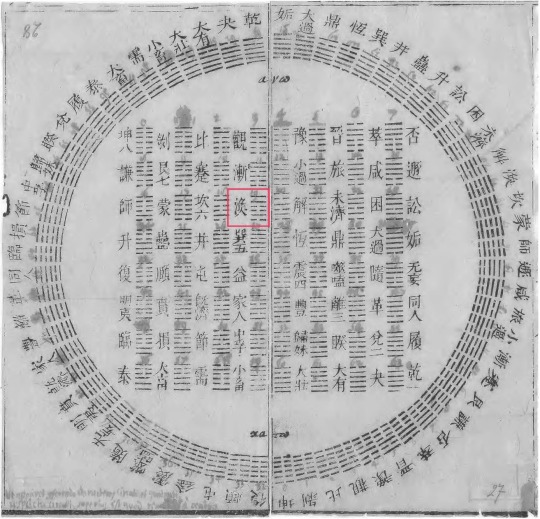
Again, it represents how gentleness can summon greatness. I copy the below from iching-online.com:

In simple terms, it symbolises water that washes away dirt and baptises new life within oneself. And the aftermath is precisely Zhan 湛 in his brother’s name, meaning crystal clear water.
Other name analyses:
Wei Wuxian
Lan Wangji
Jiang Wanyin
Lan Sizhui
#the untamed#mo dao zu shi#mdzs#mdzs meta#lan xichen#Chinese names#name analysis#male names#蓝曦臣#lan huan#蓝涣#魔道祖师#蓝湛#lan zhan#i ching#64 hexagrams#Chinese novel#Chinese drama#Chinese#Chinese cultural#陈情令#chen qing ling#cql
524 notes
·
View notes
Text
JJ Names: Fumi
For some time now I've been meaning to make a post about some of the names in Jack Jeanne because some have multiple layers of meaning while others are silly puns (eg. “chui” is the jp word used on caution signs). I wanted to be able to play more of all the side character content before writing, but I figured I could at least write about Fumi's name since I know that character pretty well and there's a lot to say about it. Since some of this stuff is explicitly referenced by the game itself, it seems intentional. There is one part that's a bit spoilery about the character which I will keep hidden at the end under a "read more" section.
Fumi's name in Japanese is 高科更文. Starting with his last name, Takashina, there's a multi-layered pun in this. You can see part of it when he initially introduces himself and says it's the same character as in the phrase 科を作る (shina wo tsukuru) which refers to having a sort of relaxed seductiveness and allure. It's also often used towards women specifically which is a very common trend with descriptors used for Fumi. The 高 kanji combined with this can also give the sense of something classy/expensive/high-grade. There's a second usage of this phrase I will put in the spoilers below.
His first name 更文/Sarafumi has a few meanings as well. The first character is often used for doing something again, usually better than the first time. Meanwhile the reading ‘fumi’ in the second character can be taken as similar to fumu/踏む which means ‘to step’. It’s also part of the verb ‘fumidasu’ which means ‘to take steps forward’ (literal and figurative). Also worth noting that the name Fumi in general can be associated with traditional style Japanese names, particularly female ones.
The second meaning of 科を作る refers to putting up a front to make something seem classier or more appealing. This directly ties into Fumi’s charming outer persona he uses to cover up his desperation and vulnerability. The fact that he references this pun in his family name while actively trying to flirt with Kisa makes you assume the first definition but both fit quite accurately.
All of the characters have name/play references in the song lyrics for the final play and Fumi’s is part of the word ‘fumidasu’.
39 notes
·
View notes
Text
AKECHI GORO — PERSONA 5 NAME ANALYSIS
Major p5r spoilers, minor “The Boy Detectives Club” spoilers.
First and foremost, I’m starting with Akechi because I thought his name was the most obvious, so I know the references in his name better. I will be making a post about Joker too, and hopefully more if I find enough material.
Akechi, meaning wisdom and intellect, Goro meaning “Fifth son.”
You might think that it was smart of the persona devs to name him Akechi for this reason, but it actually goes far deeper than that. (There’s reason for the name Goro too!)
(i promise this is relevant) Edogawa Rampo is a Japanese author who is highly important to mystery and thriller genre. He lived through the 19th-20th century and wrote many books considered classics.
Being a mystery writer, of course Edogawa had a main detective character. Known in the stories as “Japan’s greatest detective” is Akechi Kogoro, a private investigator inspired by Sherlock Holmes. That being said, naming your detective character “ Akechi” is pretty much equivalent to naming your detective character “Holmes.” Funny, right?
Akechi Kogoro is undeniable a genius, but quite eccentric. (For any BSD fans, the character Rampo is somewhat based off of Kogoro!) He appears in MANY of Edogawa’s books, as well as Edogawa’s juvenile fiction series, The Boy Detectives Club. Kogoro is a master of disguise, particularly good at disguising as young women. (Perhaps explaining Goro’s more typically effeminate appearance?)
Of course, Akechi Goro in Persona 5 is inspired by Akechi Kogoro, but it goes farther than that! I believe Goro is specifically based off of Kogoro in “The Fiend Of Twenty Faces,” the first book in Edogawa’s juvenile fiction series. The fiend of twenty faces is a gentleman thief based off of Arsène Lupin. I don’t want to spoil his name, So I’ll be calling the gentleman thief Kichi. Kichi and Kogoro have a relationship of mutual respect despite being rivals. Kichi is particularly well known for a character inspired by him, that character being Joker from Persona 5. I’d say Kichi is a notably worse person considering he threatened a group of ten year olds, but thats another story.
I won’t get too into whatever Kichi has going on since that’s more related to Joker than Goro, but you get the idea. Initially however, Kichi was going to be called “The phantom thief of twenty faces” but it was ruled out because… It wasn’t appropriate enough for kids..? Regardless, Joker and Goro are clear parallels to Kichi and Kogoro, from Mutual respect to their rather dramatic rivalry.
SECTION TWO - Akechi Goro & Akechi Mitsuhide
Goro’s name holds a genius double meaning — The other being historical figure Akechi Mitsuhide. Considering this is based on reality rather than fiction, this part may be a bit disturbing. I’ll be using Goro for Akechi Goro and Akechi for Akechi Mitsuhide, because it feels wrong to use his given name.
PS: Im a random canadian teenager, Please tell me if i got any history wrong!!!
Akechi was a samurai in the Sengoku period, but also a grand traitor. Best known as Oda Nobunaga(One of the three great unifiers of Japan)’s killer. Akechi was Oda’s bodyguard, but rebelled against him and forced him to commit seppaku, which is essentially suicide. Goro’s use of mental shutdowns is likely a reference to this, as is his rebellion against the Phantom Thieves.
SECTION THREE - Crow, Kuro, and Karasu.
Goro’s codename “Crow” is pronounced in Japanese as “Kuro”, which is “coincidentally” also the word for black. Because of this, as soon as the Black Mask was mentioned (i had already been spoiled on Goro’s codename) I immediately knew it was going to be him.
Crows represent misfortune and death, but also self-reflection and intelligence.
And finally, something that was most likely unintentional but I found funny nonetheless. When Akechi first teams up with the Phantom Thieves, he suggests his codename be “Karasu”, meaning crow. The other members suggest Crow instead since they all have english codenames. The first time (I think?) Joker is given an official name is in a spin-off manga, in which they call him Akira Kurusu. It probably means nothing, but I found the idea of codename Karasu working with Kurusu pretty funny, so I decided to mention it anyway.
That’s all I caught on to!! Let me know if I got anything wrong :)
#WAHHHH#So. many. words#i have so many thoughts on p5 naming choices….#persona 5#persona 5 royal#p5r#goro akechi#akechi goro#edogawa rampo#character analysis#kind of ?#name analysis#joker persona 5#i think goro is overrated just a lil secret….#but hes undeniable an excellently written character and his name references are SOOO good#classic lit mention and i go wild#cross posted on tiktok#riri ranting
34 notes
·
View notes
Text
Understanding the Patron-Minette affiliates through their names and aliases
This piece is the result of a hobbyist research project I've spent an unhealthy amount of time working on with the intention of bringing some context and historical significance to the names of all the Patron-Minette's affiliates!
From analysing nineteenth-century slang and investigating real criminal figures as well as their famous schemes, to exploring Hugo's potential literary inspirations, I am a strong believer that a lot of meaning can be discovered behind the names and aliases of these minor characters through close examination.
Below is a list of all 18 of the Patron-Minette affiliates (listed in the same order as Hugo introduces them in the novel), with each character's name accompanied by a short ramble about what their aliases may reference and/or allude to.
If you want to skip to the most *objectively* interesting character names, I would recommend visiting the entries for Laveuve, Homère Hogu, Kruideniers (alias Bizarro), and Mangedentelle first. But, I hope you enjoy reading the other entries too, as almost all of these names have wonderfully complex meanings and references hidden behind them!
**I’ve said it before but I’ll say it again, I am not French— and therefore I have to rely on resources available to me online (and Julie Rose's English translations of these characters' names, even though I think she often interprets these names too literally) to analyse and translate the names of these characters. So, I sincerely apologise if I misspell or misinterpret any French in the sections below!**
Panchaud; alias Printanier, alias Bigrenaille
Translation in English: Hotwhack; Springlike, Golightly
There is not much to expand upon here thanks to Julie Rose's sufficient translation of Panchaud and his various aliases into English.
'Printanier' and 'Bigrenaille' suggest that the character was fairly spritely and fast. It also arguably implies he is a young and energetic criminal. The name 'Panchaud' is also a great indicator of this character's violent nature.
The fact that the character has three different names— one with a fairly dangerous undertone— seems to me to be a purposeful choice made by Hugo in order to emphasise the character's eagerness to become a notorious and famous criminal, which he does indeed become in the 1840s.
Brujon
Information provided in canon: Comes from a dynasty of Brujons
Unfortunately, I did not find any particularly exciting information or deeper meaning behind the name to speculate over.
To put it simply, 'Brujon' is a French family name that was common in France at the time of the publication of Les Misérables , and remains a prevalent surname today. Nevertheless, this small piece of knowledge is interesting enough to me as it indirectly relates to the concept of the Brujon ‘dynasty’ quite well!
Boulatruelle
Information provided in canon: An old road-mender, who we have met before in Montfermeil
'Truelle' means trowel, and 'boule'— which is very similar to 'boula'— is a slang term for 'head' [source]. When taking these elements together, this makes Boulatruelle's very name a nice reference to the character's obsession with digging for the "buried treasure" in Montfermeil's forests.
The trowel detail might also be a nod to Boulatruelle's occupation as a road mender, since it refers to a mason's tool specifially [source]. And, with 'boule' literally translating to 'ball', perhaps there is also an allusion in the name to ball-and-chain that might connect to Boulatruelle's previous conviction and prison sentence?
Laveuve
Translation in English: the Widow
This name was particularly interesting to research because it could allude to a whole variety of relevant concepts and hence allows for a lot of speculation.
On one hand, the name could just make reference to the fact that Laveuve is a widow, which interestingly would make Laveuve a female character!
Yet, ‘veuve’ (aka 'widow') is also a Temple slang term for ‘rope’. We know this thanks to Babet, who uses the phrase during the Patron-Minette's escape from La Force. This could therefore imply that the character is a criminal known for using ropes or nooses on victims.
More fascinating still, could Laveuve actually be someone pretending to be a vulnerable, widowed woman? Surprisingly, this was a type of criminal scam sometimes famously used by certain criminals in the nineteenth-century. For example, in the 1830s there was a criminal named Jean-Francais Chardon who was a conman and female impersonator known as “la Tante” [source]. Could Laveuve have been a similar kind of criminal?
Finistère
The name appears to derive from the Latin ‘Finis Terræ’, which means ‘End of the world’. Finistère is also the name of a place in Brittany, France. As a result of these factors, I have always associated the character with dock / port work, but of course nothing can be proved of this.
Homère Hogu
Information provided in canon: A black man (Julie Rose translates the phrase as such, but Victor Hugo uses a derogatory term when describing Homère Hogu in the original publication. I have replaced all mentions of the word with ‘n—’ where necessary below)
I found a captivating research paper about the onomastics of Les Misérables which touches on Homère Hogu being a purposeful variant of Victor Hugo’s own name:
Hugo ne s'y trompait pas lorsqu'il confia son “épopée définitive” de la “conscience humaine” (I, VII, 3; OC XI, 201) à un frère anagrammatique: ce bandit, le “n—” Homère-Hogu (III, VII, 4; OC XI, 536), est le hors-la-loi noir parmi les blancs; mais misérable “n—”, il est également par la grâce de la polysémie, celui qui est chargé par un écrivain célèbre d'écrire à sa place un roman, Les Misérables. Un nom étant un moi selon Jean Valjean, on reconnaîtra l'insaisissable poète des misérables dans ce double caché au cœur du roman. Hugo-Hogu.
[Roughly translated into English: Hugo was not mistaken when he entrusted his “definitive epic” of the “human conscience” (I, VII, 3; OC XI, 201) to a brother anagrammatical: this bandit, the “n—” Homère-Hogu (III, VII, 4; OC XI, 536), is the black outlaw among the whites; but miserable “n—”, he is also, by the grace of polysemy, the one who is commissioned by a famous writer to write a novel in his place, Les Miserables. A name being a self according to Jean Valjean, we will recognize the elusive poet of the wretched in this hidden double at the heart of the novel. Hugo-Hogu.]
I really recommend reading the full paper if this kind of topic interests you (click here to access the article). I have a limited understanding of the piece since it is written in French, but the parts that I could comprehend were absolutely fascinating!
Mardisoir
Translation in English: Tuesday Night
I don't have much to say on this name despite undertaking lots of research. It seems to mean nothing more than Tuesday evening / night. Perhaps the name alludes to an activity or event that commonly occurred on Tuesday nights, but I haven't been able to discover any information related to this idea thus far. The only *potential* research avenues that I discovered were:
'Mardi' is slang for beating up someone in Romanian [source], but no such slang seems to apply to the French language.
'Mardi s'il fait chaud' was once a popular proverb that was used in the same way as the English expression 'only when pigs fly' [source]. However, there is no likely connection between this phrase and Mardisoir's name since the phrases share nothing aside from the term 'Mardi'.
Dépêche
Translation in English: Dispatch
Whilst Julie Rose translates the name only to ‘Dispatch’, dépêche is a term that specifically refers to the dispatch of a message or information.
In addition, my own research has evidenced that in thieves' slang, ‘dépêche’ has a slightly different definition— meaning to ‘ease oneself by evacuation’, rather than simply dispatching a message [source].
Therefore there are two potential avenues for the criminal "subspecies" that Dépêche represents. Either the character is a messenger for the group, or perhaps is instead a criminal known for deserting others when things get tough.
Fauntleroy; alias Bouquetière
Translation in English: Flowergirl*
First off, let me debunk any suggestions that this character's name could in any way be linked to the famous story Little Lord Fauntleroy. It would have been impossible, since Little Lord Fauntleroy was published over 23 years after Les Misérables.
The name Fauntleroy is a real surname derived from the phrase 'le enfant le roy', which translates to 'child of the king' [source].
Fauntleroy's alias 'Bouquetière' translates to Flowergirl, likely referring to the character's occupation. Interestingly enough, at this point in history there was a common association between "Flowergirls" and prostitutes (I have previously written about this before), and I think Hugo takes advantage of this connection to coyly indicate to readers that Fauntleroy is a prostitute. Julie Rose even goes so far as to label the character as a "prostitute" in her translation, even though it is never explicitly stated by Victor Hugo.
Glorieux
Translation in English: Glorious
Information provided in canon: A freed convict
I haven't much to add here about the name apart from the related meanings of 'glorieux' that suggest this character might have once being a glorious and renowned criminal.
Aside from its direct translation to 'glorious', 'glorieux' can also mean 'self-satisfied', 'illustrious' and 'distinguished' [source]. This perhaps implies that the character had a particularly successful criminal career in the past.
Yet, I also want to point out the brilliantly ironic and sarcastic element to Glorieux's name! How can this criminal be so 'glorious' if he managed to get imprisoned in jail, and served his whole sentence (note he is a freed convict, which means he served his time in prison and did not escape in any illustrious escape!). I bet Hugo's juxtaposition of alias against the accompanying information that he was a 'freed convict' was intended to give readers a little laugh!
Barrecarrosse; alias Monsieur Dupont
Translation in English: Coachrod
Barrecarrosse’s name is almost certainly making reference to some famous nineteenth-century criminal plots involving horse-drawn carriages being ambushed and robbed by highwaymen and/or padfoots. Note that ‘barre’ means iron rod specifically, and perhaps it specifies the kind of weapon that this criminal might have carried.
Interestingly, Barrecarrosse’s alias, ‘Dupont’, is a common French surname that translates to ‘from the bridge’.
When taken together, both of Barrecarrosse’s names invoke an image in my mind of a shady criminal who hangs around on bridges that are used by carriages to transport goods and people into Paris, waiting to encounter passing carriages and attacking them in order to steal valuables. We are even told later in the novel that this character prowls the Grenelle area, which indeed was located just on the outskirts of the city’s nineteenth-century borders, right next to the Seine.
Lesplanade-du-Sud
Translation in English: South-Esplanade
This alias has me stumped. Esplande means 'precincts' in English [source], and I am assuming the name refers to some location or place— but I have not been able to decipher any further meaning to the name thus far.
If anyone has any insights or suggestions for possible meanings behind this name I would love to hear from you!
Poussagrive
Translation in English: Pushathrush
'Grive' appears to be used in a number of French slang phrases of the nineteenth-century to describe giving out warning calls. This might imply that Poussagrive could have taken on the role of a look-out for the gang, acting like a thrush songbird and calling out when spotting danger.
The multiple meanings of the French word 'poussa' help to support this idea: it has a lot of alternative definitions other than 'push', most of which relate more-so to speech: it can be defined as 'pushed, uttered, prompted, drove, let out, urged, heaved, led him, shoved, thrust, breathed, spurred' [source]
I think it is interesting to additionally note here that 'grive' was also slang in the nineteenth-century for 'army; military patrol ; warder' [source]. So, Poussagrive could also refer to a calling used to alert or command the Patron-Minette in a ‘military’ fashion, ordering them about as if they were some kind of ‘patrol’!
Carmagnolet
The name shares similarities with the famous revolutionary song ‘La Carmagnole’, wherein a carmagnole is the name of a short jacket worn by working-class revolutionary militants [source].
So, perhaps Carmagnolet is a character interested in revolution (which would open up fascinating possibilities for this character in terms of potential connections to Les Amis). Or, might it just mean that this criminal has a rebellious, wildly anarchistic personality. Or, maybe Carmagnolet is simply known by this name because he wears a Carmagnole jacket?
*As I’ve said before I don’t speak French, and therefore don’t know how the added ‘t’ at the end of the name changes its meaning— and would really appreciate it if anybody could share some insight into this!*
Kruideniers; alias Bizarro
Kruideniers is a name with multiple interpretations, yet none seem to give away much of an idea about the character. I've simply compiled all of the unconnected pieces of research I stumbled across below. Curiously, most of the information I sourced points back to the Netherlands rather than to France:
A denier is a type of silver Frankish coin [source]. Interestingly, three deniers make a liard (lots of fun opportunities to speculate over the monetary links and any corresponding connections between the characters of 'Kruideniers' and 'Demi-Liard' here).
'krui' is Dutch slang for 'push or carry forward' [source].
Oddly enough, ‘Kruideniers’ is Dutch for grocer.
As for the character's alias, Bizarro... my research took me down a bit of a rabbit-hole and led me to the fascinating tale of Francesco Moscato, alias Vizzarru. Moscato was an Italian brigand, mass murderer, and seducer. I won't waste time recounting the entire story but if you're interested in reading about Moscato you can do so here.
Whilst the name Vizzarru is not quite Bizarro, what is important to note is that Sir Walter Scott wrote a story about Moscato in 1832 entitled Bizarro (although it was never published at the time!). And, who was known to be a good friend and admirer of Walter Scott? None other than Victor Hugo!
Of course, I cannot prove anything about Hugo taking the name Bizarro from Scott, but its fun to speculate that perhaps there had been a conversation between these two authors! Furthermore, Alexandre Dumas, another friend and rival of Victor Hugo, had taken inspiration from Vizzarru and written about the figure too! Perhaps Hugo and Dumas could have discussed Moscato / Vizzarru / Bizarro at the Club des Hashischins, and Hugo had retained the name in his head?
Mangedentelle
Translation in English: Eatlace
This one was particularly interesting to research, and in this name there is a piece of translation that I disagree with Julie Rose over.
Personally, I think Rose ended up translating this character's name too literally when referring to it in English as 'eatlace'.
Whilst Rose is objectively correct to translate 'dentelle' to lace, my own research has suggested that 'dentelle' is thieves’ argot for 'bank notes, "rags, flimsies, screenes, or longtailed ones"' [source].
To me, this definition of 'dentelle' makes more sense in the context of the name of a Patron-Minette affiliate. It seems significantly more probable that this character's name would have referred to bank notes rather than lace fabric.
However, I am still stumped as to what the 'mange' / 'eat' part of the name is meant to imply or represent. The closest, most logical thing I can think of is that 'mange' in this context translates to 'hunger' or 'appetite', as it meant originally in Old French [source].
If we are to be convinced enough by this research, it would mean Mangedentelle theoretically translates to 'appetite for money'. To me, that makes much more sense than translating the name as 'eatlace'.
Les-pieds-en-l'air
Translation in English: Feet-in-the-air
This is a simple one to explain. The character’s name alludes to a bawdy sex position, and clearly implies that Les-pieds-en-l’air is a prostitute.
Demi-liard; alias Deux-milliards
Translation in English: Half-a-liard; Two Billion
Another relatively easy name to decipher— a demi-liard is a low value term of coinage.
The conjunction between this character's two aliases is wonderfully comedic. With the 'Demi-Liard' alias, this character is described as being extremely poor (if a liard was at one point the smallest coin in France in terms of its monetary value, then a demi-liard would have been even more pitiful!). Yet, the other alias, ‘Deux-milliards’ would suggest that the character is extremely wealthy!
#patron minette#patron-minette#patron minette affiliates#les miserables#les mis#the brick#les miserables analysis#name analysis#meta#historical context#brujon#demi-liard#boulatruelle#panchaud#fauntleroy#long post
80 notes
·
View notes
Text
Okay, let's guess Wu yong crown Prince's name.
*warning I only know minimal Chinese*
Since he calls Xie Lian, XianLe, which is just changing the places of the "e" with the "an", then it's not so far-fetched to assume that we should change the "u" with the "ong" of Wu Yong and end up with Yu Wong.
But! In Chinese there is no such thing as "wong" as far as I know and the closest thing to it would be "wang". And now we have multiple characters to chose from.
A few that I thought fit well with his background and character:
忘 meaning to forget because it's a nice parallel to nian 念 from Mei Nianqing that in a way means to remember.
旺 meaning prosperous which is self-explanatory...
枉 meaning wrong
罔 meaning to deceive
惘 meaning disappointment
#jun wu#junmei#mxtx tgcf#tgcf#heaven official's blessing#mei nianqing#chinese language#name analysis
10 notes
·
View notes
Text
Adrien Agreste

So, in Chat Blanc, it was revealed that Adrien's fifth name is Athanase. And it had been a running joke ever since what all four of Adrien's other middle names are.
This apparently canon German game card reveals Adrien's full name as Adrien Émile Gabriel Donatien Athanase Agreste, which has some pretty interesting connotations.
All information was taken from the Bump, except for Agreste, which was taken from the Cambridge Dictionary.
Adrien: The French form of Adrian. The name has Latin origin, meaning "son of Adria", with relations to the Hadria province and former Adria River, both located in Italy. Adrien also has Greek roots, meaning "rich".
Émile: A classic French name, Émile means "eager". As in full of zest for life, enthusiastic, and willing to meet the day heads-on.
Gabriel: Apart from being an obvious namesake to his father, Gabriel most powerfully have Hebrew and angelic roots. It is the name of the Archangel Gabriel, who delivered the news of Jesus' birth to Mary in Christainty and inspired Muhammed to write the Quran in Islam. Gabriel means "man of God", and while Adrien is never explicitly religious, he has been shown to celebrate Christmas, and had been making some damning similarities between himself and (fallen) angels.

Donatien: Could be derived from the Italian name Donatello, Donatien is another Biblical name, meaning "given" or "gift from God". In this case, the givee is Gabriel and the 'God' is Emilie.
Athanase: My favourite of Adrien's middle names, Athanase derives from the Greek word Athanasios, meaning "immortal". If rumours about Sentibeings are right, Adrien might possibly already be immortal. Otherwise, Adrien had already made living history by being the in-world Black Cat, and outwardly, one of the most famous and beloved Miraculous Ladybug characters.
Agreste: A last name that Gabriel made up, if Revelation is leading us right, meaning rural and rustic. Which honestly cannot be right, but who am I to challenge the declarations of the Cambridge Dictionary? Thing is, since Agreste is a new name that Gabriel adopted for himself, wouldn't he have chose something more grand and imperious, something that'll distract his new social circle from his humble roots? Or maybe it's a reference to how Gabriel, at the base of it all, is animalistic and yearns to return to the simpleness of what he once had.
If we are to combine Adrien's name together, it would mean a wealthy and immortal gift from God with a penchant for the rustic. Which is an awkward explanation, but strangely fitting for Adrien.
8 notes
·
View notes
Text
So, I’m sure that by now at least some of my followers know that I LOVE looking into meanings of names and comparing them to the characters that carry those names, to see if there’s any purpose or hidden meanings.
Today, I decided to look into some Toh characters - aka, brothers Wittebane. I don’t know if anyone’s pointed this out yet, so I wanted to share what I found!
Philip

So, the name Philip means “warlike” - and yes, it also means lover of horses but I think we can ignore that meaning in this context :’)
Philip is a manipulative, ruthless man willing to go to the extremes to reach his goals. He’s willing to hurt people, to kill people and he places himself above others with the justification of his actions being for the greater good. He’s strategic and thinks his plans through, seemingly assuming he knows the best. His dedication to his goals, to his own personal victories is unwavering and he isn’t afraid to sacrifice friends and family on the way.
Philip Wittebane is a warlike man - his name is rather appropriate for him.
Caleb
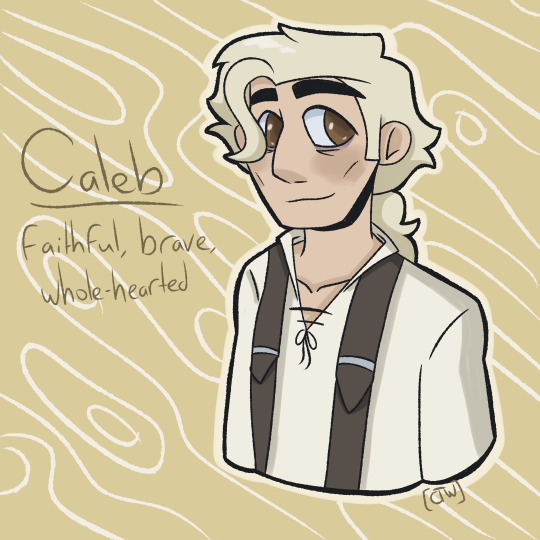
Caleb means many things, including faithful, brave, bold and whole-hearted. We don’t know much about him, so analyzing his name’s meaning was (and is) more difficult.
So, what do we do know about him? We know he used to be a witch hunter. We know he saw the magical side of the Demon realm and saw good in the people he previously viewed as danger. We know he was close with a witch - and if the paintings in Philip’s mindscape are to be believed, he started - or was about to start - a family with one.
We also know that he was a good man. Every Grimwalker Philip made held his good nature - resulting in each and every one of them betraying him eventually. We don’t know how similar he and Hunter are by personality, but I think it’s safe to assume they do share some core traits, based on the pattern there has been with the Golden Guards and Philip’s relationship.
Another thing that speaks for his goodness is how after seeing Philip’s curse (or... whatever the palisman soul situation really is) he still fully accepted him - we see that in the mindscape paintings as well. He is loving towards his younger brother until the end, no matter how much Philip despises his relationship with the Demon realm and Evelyn.
It’s not much, but it’s something. I’m going off on only the little bits we know about him, but I do think that he’s deserving of the meanings of his name. He was faithful till the end - to Philip, to Evelyn. He might’ve been a witch hunter, but he was willing to give them a chance to understand them. (Of course, being a witch hunter is a big big yikes and there’s obviously problems with that kind of a view towards a group of people... but that’s not really the point here)
And he was brave. He took a chance on these people he’d grown up seeing as the enemy and fell in love with them. He was brave enough to step away from his old beliefs and learn.
So, yes. I think Caleb Wittebane was a brave, whole-hearted man.
Now, have the names been chosen on purpose? Considering the amount of detailing in this show, I think it’s very possible. It would be one hell of a coincidence if they weren’t.
Their last name
Yeah, I wasn’t just gonna go on about their first names and not consider the family name too. Wittebane isn’t an actual last name, so it was way more difficult to look into.
First thing I found was a vague explanation on some name meaning site. It claims “witte” stands for white and “bane” stands for menace. Which uh... I don’t know about that being the designed meaning of the name :’)
Or well, the two words combined anyway. I found a post on Reddit which I feel more drawn to. The poster had searched up what “witch” was in old English. And as it turns out, wiċċe is the female noun for the old English language’s version of witch.
So, my own conclusion is that their last name is supposed to mean something along the lines of “Bane of Witches”. It’s obviously much more open for everyone’s personal interpretation, so I’m open for future analyzing on it.
#the owl house#toh#the owl house belos#the owl house phillip wittebane#philip wittebane#emperor belos#the owl house wittebro#toh wittebro#the owl house caleb#caleb wittebane#toh wittebanes#toh characters#toh character analysis#brief character analysis#name analysis#tumble rambles its little heart out for fun#these are all just my own opinions
49 notes
·
View notes
Text
Helbram's name!
So I'm all about name meanings, but Helbram's name doesn't seem to actually be...real. If you try to look up the name meaning you get nothing.
BUT!
I found a loophole! To deconstruct his name and find meaning therein! So I broke his name into prefix and suffix.
Hel + Bram
"Hel" from behindthename.com "to conceal, to cover" in Old Norse.
"Bram" from mamanatural.com bramble; a thicket of wild gorse; raven in Scottish.
So Helbram's name could mean "concealing bramble" which ties into his rose symbolism actually.
#nanatsu no taizai#seven deadly sins#7ds#nnt#7ds fairy#nnt fairy#7ds helbram#nnt helbram#7ds analysis#nnt analysis#name meanings#name analysis
3 notes
·
View notes
Text
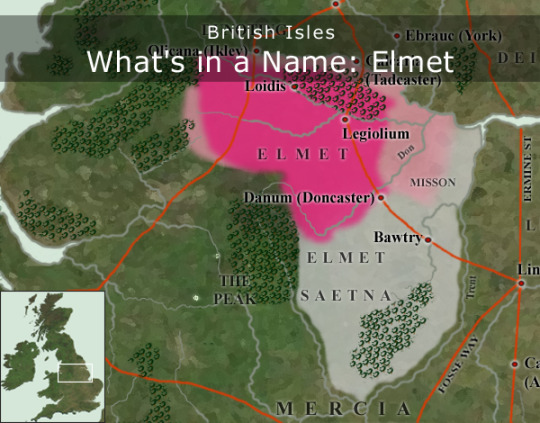
What's in a Name: Elmet
As part of the long-running 'What's in a Name' series, the origin of the name 'Elmet' is not easy to deduce, and that deduction is rather tortuous.
#history#historyfiles#elmet#whats in a name#linguistics#post-roman#name analysis#Romano-Britons#britain
2 notes
·
View notes
Text
Eugene’s Name Analysis
I looked up the meaning of Eugene’s name and I found this:
“From Sino-Korean 裕 "abundant, rich, plentiful", 楢 "tinder" or 有 "have, own, possess; exist" (yu), and 珍 "precious, valuable, rare" or 真 "truth" (jin).”
I’m not sure what the intended meaning is from PTJ himself but here is what I can glean:
Rich and plentiful could refer to Eugene’s wealth, Workers, and its army
Tinder is flammable material, like wood for lighting fire. Could that allude to Workers "lighting on fire” and being destroyed?
Possess could refer to Eugene’s status as chairman and general influence over Seoul and other places
Precious and valuable is hard, but maybe it refers to the way Eugene was discovered. Introduced by Goo, and ended up being a diamond in the rough. Or maybe how almost no one is able to hurt Eugene because of his army and friends. Or it could have something to do with his backstory.
Truth is obvious. Eugene knows pretty much everything about all the characters, and specifically knows the truth about Charles Choi.
Eugene is rich, precious, and the possessor of truth. He also might crash and burn.
@sei-minjuhan
#lookism#lookism eugene#lookism yujin#eugene name#name analysis#webtoon#manhwa#analysis#should i do someone else
24 notes
·
View notes
Text
Cambree Layne Smith Name Analysis
Tori fired up the baby canon again! She and Bobby announced they were expecting baby 4, a girl, on 9th May 2022. Very little else was said until the birth announcement on 5th August. Baby Cambree Layne arrived on 2nd August 2022 weighing 5lbs 2oz.

Cambree has not entered the top 1000 baby names since records began in 1900. The meaning of Cambree is 'the people'
Cambree took her mother's middle name of Layne, meaning 'path', has had slightly more success, but only very recently. It entered the top 1000 girl names in 2020 at position 926. 2021 saw 332 Laynes born with is clinching the 828th spot. Maybe Tori is a trendsetter.
Layne has enjoyed much more success as a boy's name. It entered the top 1000 in 1957 at #967. It rose through the 6 and 700s over the following 8 years. 192 Laynes were born in 1959 and earnt its highest position to date at #562. Then the decline began; it fell to #807 by 1965. 6 years later in 1970 it left the top 1000 at #869. That is not the end of the story. 1994 saw somewhat of a rejuvenation when Layne re-entered the top 1000 boy names in #926 position. In 1995, the year of Tori's birth, it jumped to #717. It has remained strong in the 6 and 700s during the past 25 years, and in 2021 429 male Laynes were born, earning it #640 in the statistics.


#fundie#bates family#fundie baby#smith family#tori and bobby#baby girl#better get this posted before Tori announces another pregnancy#name analysis#cambree smith#smith 4
9 notes
·
View notes
Text
Can we just address for a second that calling El “Eleven” isn’t used negatively? If anything, it’s used often in a reassociated manner. It’s her full name. If it was universally negative as is often claimed surrounding Mike’s season 4 usage of it, Will wouldn’t have called her “Eleven” during their reunion. That was in no way a negative or tense moment between them.
6 notes
·
View notes
Text
Theories and Analysis on the Demigod names
Something I just realized about the demigods’ names…
Korina, Marit, Zenobia, Sophist, Tryphon - all names with Greek origins.
Mors and Kion are the only two demigods with non-Greek names (Mors is Latin, Kion is Gaelic but could also be Persian depending on the spelling)
With Mors, I just assumed he was given a non-Greek name to show how he doesn’t fit in with the other demigods. Maybe this is me looking too much into things, but either Kion has a non-Greek name to parallel Mors, or he’ll end up having some issues fitting in with the gods / conflict with his identity. I mean, he did kind of imply in a previous episode that he’s one of the kids that Zeus neglects. Or maybe his human mom named him. Idk.
Also while we’re here, I want to look at name meanings and what they mean for the character.
Korina - maiden (also young woman, bride, and other similar meanings). Fitting for her innocent nature as well as her current predicament in the story.
Mors - death; name of the god of death in the Roman pantheon. Mors is a child of a god of death and ends up having to fill the role as he gets older, so pretty fitting.
Marit - pearl (also lady or mistress of the house). We don’t know much about her yet, but I guess it could be referencing her being a daughter of Dionysus? Something about the lady of the house holding parties or something I guess
Zenobia - life of Zeus, whose life derives of Zeus (just all stuff related to Zeus); very straightforward for a daughter of Zeus.
Sophist - a person who practices clever, specious reasoning, expert, wise man, etc. Makes sense for a son of Athena.
Tryphon - soft, delicate, one who lives in luxury. He’s a son of Aphrodite, and from what we’ve seen he seems a bit on the arrogant side.
Kion / Keon - god is gracious, ancient, of Cian, young warrior (Gaelic); king, realm (Persian). More vague than Zenobia, but still places the emphasis on the power and status he has as a son of Zeus.
Addendum: Nefeli - Greek name that means cloud. She’s a child of Hermes, so something sky / flight related makes sense.
Also I’m not going to do the demis like Mitch and Bryan who were name dropped but will probably never make any physical appearances in the series. Besides, they’re Origins of Olympus characters, and this is about Korina’s Origin.
4 notes
·
View notes
Text








2.12 Chimney Begins - 2.09 Hen Begins - 2.16 Bobby Begins Again - 7.04 Buck, Bothered and Bewildered
Tommy's family arc
#911#911edit#911 abc#911 show#911 spoilers#911 season 7#tommy kinard#evan buckley#evan 'buck' buckley#kinley#bucktommy#kinkley#tevan#pick a ship name you guys and thanks for picking tevan the most correct name#anyway analysis time!#looking back with Modern Knowledge tm about why tommy acts the way he does in the past... babygirl you were so closeted I'm so proud#babygirl was back there getting into narnia#he was so resistant to letting go of the pseudo-family he'd found at the 118 in chimney begins#even tho it was a good old boys club that he knew he really didn't fit into he was making himself fit because at least it was something#but then he let chimney in and then hen came around and he saw a very queer person being openly queer and not giving a fuck what they think#and I think his behavior in that episode was trying to support hen as much as he could without outing himself#because like. how do you give up years of relative safety with people who do care about you they just won't like you anymore if you're *you#then he meets buck in s7 which is like 10-20 years later timeline is fake and he's like oh. this is what unconditional family is#and he's like oh. maybe I can come back. maybe I can be part of this again somehow. maybe we've both grown enough#or at the very least he'll be close to something he never believed would really happen for him#rant over tevan my beloved tim minear pillow cold both sides god bless#my edits
2K notes
·
View notes